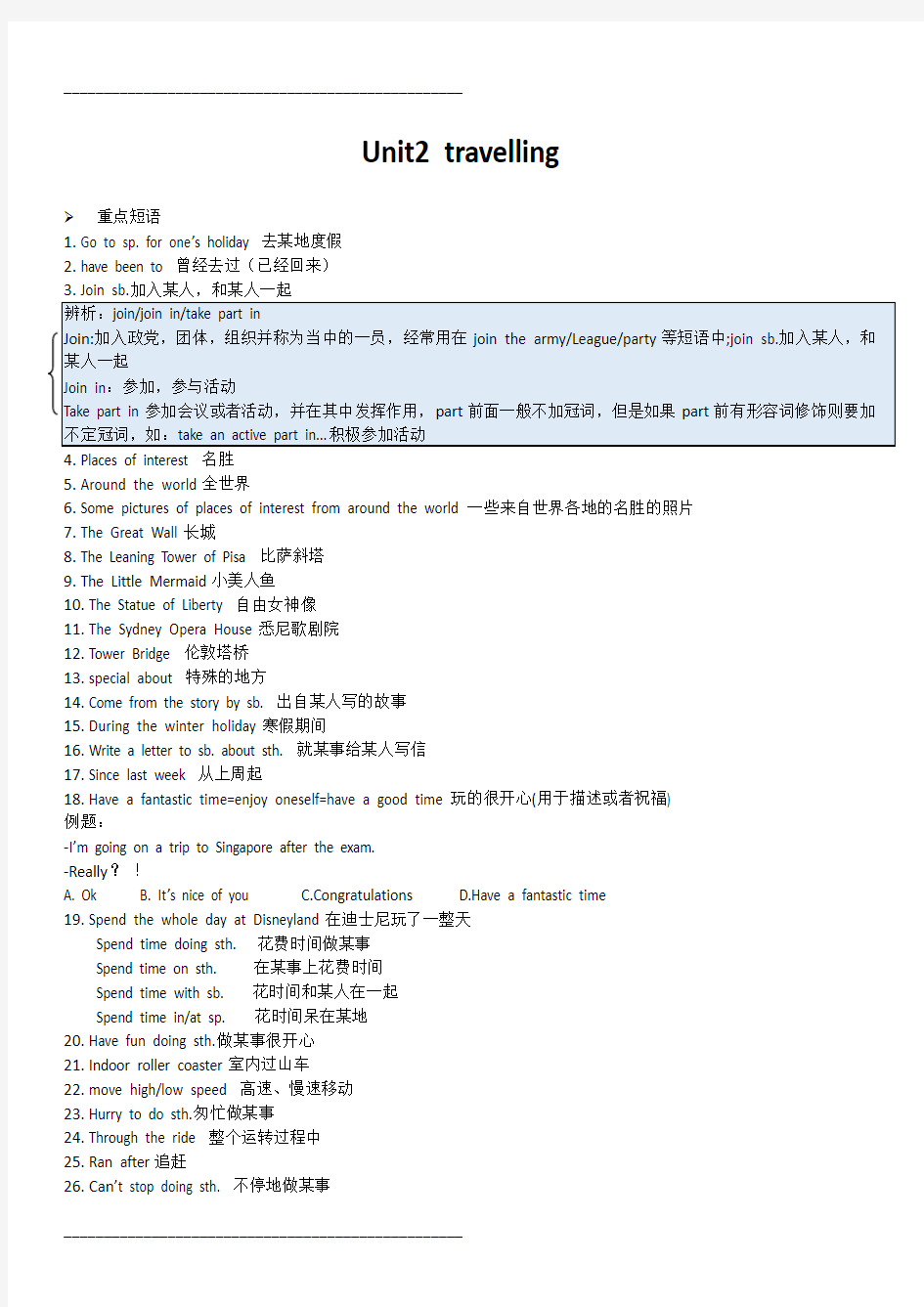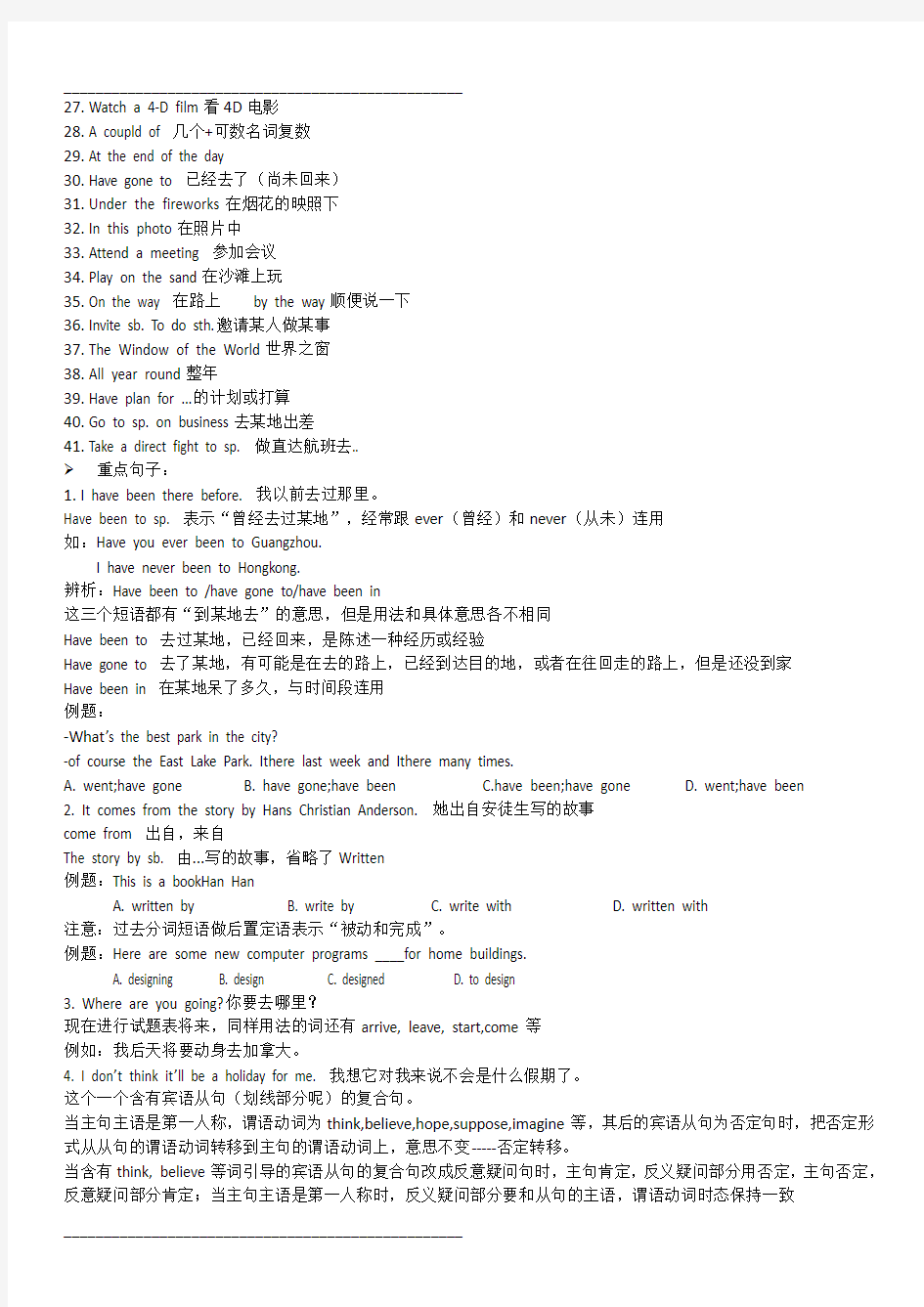苏教版英语8b unit2知识点梳理


Unit2 travelling
?重点短语
1.Go to sp. for one’s holiday 去某地度假
2.have been to 曾经去过(已经回来)
4.Places of interest 名胜
5.Around the world全世界
6.Some pictures of places of interest from around the world一些来自世界各地的名胜的照片
7.The Great Wall长城
8.The Leaning Tower of Pisa 比萨斜塔
9.The Little Mermaid小美人鱼
10.The Statue of Liberty 自由女神像
11.The Sydney Opera House悉尼歌剧院
12.Tower Bridge 伦敦塔桥
13.special about 特殊的地方
https://www.360docs.net/doc/9e6090078.html,e from the story by sb. 出自某人写的故事
15.During the winter holiday寒假期间
16.Write a letter to sb. about sth. 就某事给某人写信
17.Since last week 从上周起
18.Have a fantastic time=enjoy oneself=have a good time玩的很开心(用于描述或者祝福)
例题:
-I’m going on a trip to Singapore after the exam.
-Really?!
A. Ok
B. It’s nice of you
C.Congratulations
D.Have a fantastic time
19.Spend the whole day at Disneyland在迪士尼玩了一整天
Spend time doing sth. 花费时间做某事
Spend time on sth. 在某事上花费时间
Spend time with sb. 花时间和某人在一起
Spend time in/at sp. 花时间呆在某地
20.Have fun doing sth.做某事很开心
21.Indoor roller coaster室内过山车
22.move high/low speed 高速、慢速移动
23.Hurry to do sth.匆忙做某事
24.Through the ride 整个运转过程中
25.Ran after追赶
26.Can’t stop doing sth. 不停地做某事
27.Watch a 4-D film看4D电影
28.A coupld of 几个+可数名词复数
29.At the end of the day
30.Have gone to 已经去了(尚未回来)
31.Under the fireworks在烟花的映照下
32.In this photo在照片中
33.Attend a meeting 参加会议
34.Play on the sand在沙滩上玩
35.On the way 在路上by the way顺便说一下
36.Invite sb. To do sth.邀请某人做某事
37.The Window of the World世界之窗
38.All year round整年
39.Have plan for ...的计划或打算
40.Go to sp. on business去某地出差
41.Take a direct fight to sp. 做直达航班去..
?重点句子:
1.I have been there before. 我以前去过那里。
Have been to sp. 表示“曾经去过某地”,经常跟ever(曾经)和never(从未)连用
如:Have you ever been to Guangzhou.
I have never been to Hongkong.
辨析:Have been to /have gone to/have been in
这三个短语都有“到某地去”的意思,但是用法和具体意思各不相同
Have been to 去过某地,已经回来,是陈述一种经历或经验
Have gone to 去了某地,有可能是在去的路上,已经到达目的地,或者在往回走的路上,但是还没到家
Have been in 在某地呆了多久,与时间段连用
例题:
-What’s the best park in the city?
-of course the East Lake Park. Ithere last week and Ithere many times.
A. went;have gone
B. have gone;have been
C.have been;have gone
D. went;have been
2. It comes from the story by Hans Christian Anderson. 她出自安徒生写的故事
come from 出自,来自
The story by sb. 由...写的故事,省略了Written
例题:This is a bookHan Han
A. written by
B. write by
C. write with
D. written with
注意:过去分词短语做后置定语表示“被动和完成”。
例题:Here are some new computer programs ____for home buildings.
A. designing
B. design
C. designed
D. to design
3. Where are you going?你要去哪里?
现在进行试题表将来,同样用法的词还有arrive, leave, start,come等
例如:我后天将要动身去加拿大。
4. I don’t think it’ll be a holiday for me. 我想它对我来说不会是什么假期了。
这个一个含有宾语从句(划线部分呢)的复合句。
当主句主语是第一人称,谓语动词为think,believe,hope,suppose,imagine等,其后的宾语从句为否定句时,把否定形式从从句的谓语动词转移到主句的谓语动词上,意思不变-----否定转移。
当含有think, believe等词引导的宾语从句的复合句改成反意疑问句时,主句肯定,反义疑问部分用否定,主句否定,反意疑问部分肯定;当主句主语是第一人称时,反义疑问部分要和从句的主语,谓语动词时态保持一致
如: I don’t think Tom is right,is he?
例题:我认为你在家教孩子并不明智。
5.I miss you so much!
miss (1) 动词,错过。他起床太晚了,错过了到学校的早班车。
(2) 动词,想念。我们已经2年没有见面了,我非常想念你。
6.We could even smell the apple pie and feel the wind.
Smell和feel是及物动词,表示闻到,感觉到
这两个词还可以做感官动词,后加形容词Cotton feels very soft. 棉花摸上去很柔软。
7.I ran after them and couldn’t stop taking photos.
辨析:Stop doing sth/stop to do sth/can’t stop doing sth
(1)stop doing sth. 停止做某事stop sb.(from)doing sth. 阻止某人做某事
(2)Can’t stop doing sth.忍不住一直做某事=can’t help doing sth.
(3)Stop to do sth. 停下来去做某事
当学生们看见老师时就停止说笑了。
我们已经工作很长时间了,停下来休息一会儿好吗?
听到那个消息她忍不住哭了。
8. It moved at high speed and was really exciting! We were screaming and laughing through the ride. 它告诉运转,真是令人兴奋,整个乘坐过程当中我们一直在尖叫大笑。
(1)speed 速度,不可数名词
At high speed 以高速at low speed以慢速at full speed 全速at top speed全速
Speed up加速
但是,如果要表示“以...的速度”要用固定短语at a/the speed of
例如:He drove at a speed of sixty miles per hour.
(2)exciting 令人兴奋的,是人激动的,用来修饰物
Excited 兴奋的,激动的,用来修饰人be excited at sth. 为...而激动
例题:
-What news! The Chinese Women’s Badminton Team won the Uber Cup again.
-Really? That’s great!
A.interesting
B. interested
C. exciting
D. Excited
其他用法相似的单词
Intereted 感兴趣的interesting有趣的
Worried 担心的,发愁的worrying 令人发愁的
Tired 疲惫的,疲倦的tiring 令人疲倦的
Bored感到厌烦的boring 令人厌烦的
Frightened感到害怕的frightening 令人害怕的
(3)Ride名词,表示乘车或骑车的短途路程
A short bus ride短途公交旅行
An hour’s ride一个小时的骑行
(4)辨析:cross, across, through
Across 介词,需要跟在动词之后表示穿过go across
cross作动词,表示“穿过,横穿”,主要表示在物体表面上横穿,与路表面形成十字,如横穿马路,过桥,过河等;做名词,表示“十字架,十字路口”cross the road=go across the road穿过马路
Through 为在立体空间内穿过,如go through the forest 穿过森林,go through the tunnel穿过隧道,come through the glass穿透玻璃
9.She can go there in any season except winter 除了冬天,她可以在其他任何季节去那儿。
Except “除...之外”,经常与no, all, nobody, anything, everything, everybody, everywhere等词连用,其后经常加名词和代词,表示它们从总类中排除,做减法。
除了奇异果以外,我喜欢所有的水果。.
除你之外,没有人迟到。. Besides”除...之外还有”,做加法。
除了英语之外我还有其他作业。. Except for “除...之外”放在句首,替代except.
?语法:现在完成时态的完成和未完成用法。
1. 定义:
①现在完成时表示过去发生或已经完成的对现在仍有影响的动作。
I haven’t find my key yet. I’m afraid I have lost it. 我到现在也没找到我的钥匙,怕是钥匙已经丢了。(过去丢的,现在仍没找到)
②表示动作或状态过去已经开始,一直延续到现在,也许还要继续持续下去,常和“for+时间段”、“since+时间点”连用。Mr. Zhang has taught English for 20 years. 张老师已经教了20多年英语了。(还会继续教下去)
2. 现在完成时的构成:
主语+ have / has + 过去分词+ 其他(当主语是第三人称单数时用has,其余人称用have。
过去分词:规则动词的过去分词构成与动词过去式相同;不规则动词需要特殊记忆,在讲一般过去时时已有列出部分动词过去分词变化表。)
3.句型
否定式:主语+ haven’t / hasn’t + 过去分词+ 其他
疑问式:Have / Has + 主语+ 过去分词+ 其他?
简略答语:Yes, 主语+ have / has.(肯定)/No, 主语+ haven’t / hasn’t.(否定)
4. 与现在完成时连用的时间状语:
①already, just,yet动作或状态已经、刚刚或还没有发生, 注意:表示已经的时候already 用在肯定句中,yet用在否定或疑问句中,如:He has just returned from America.他刚从美国回来。
②for+时间段、since+时间点(表示动作或状态过去已经开始,一直延续到现在,也许还要继续持续下去)
③ever,never(表示到现在为止动作或状态曾经或从来没有发生过),多放在助动词与过去分词之间。ever用于否定句和疑问句中, never常与before连用。
Have you ever been to London?你去过伦敦吗?
④Once,twice或者基数词+times (表示某一动作到现在为止已经发生了若干次。)
I have already been to Beijing four times.
⑤so far(表示到目前为止动作或状态已经发生)
⑥in the past few years(从过去到现在的几年里,表示到现在已经完成的动作)
⑦before,意为“以前”,指过去某个不确定时候,总是放在句末,不受句型限制。
I have never heard of this singer before. 我从未听过这名歌星。
5. 延续性动词和非延续性动词在完成时中的定义:
①现在完成时表示动作从过去某个时间开始一直持续到现在,因此在与段时间连用时应注意肯定句中的谓语动词不能和一段时间连用。如:
误:I have left my hometown for 10 years. 正:I have been away from my hometown for 10 years.
②在否定句中,非延续性动词可以和段时间连用。
如:We haven’t heard from Jane for a long time. 我们(到现在为止)有好一段时间没听到简的消息了。
③非延续性动词与延续性动词的相互转化举例:
leave --- be away, borrow --- keep, begin/start --- be on, buy --- have,
die --- be dead, finish --- be over, join --- be in+组织机构, be a member of+组织机构,
open sth --- keep sth open, fall ill --- be ill, get up---be up, come here --- be here
